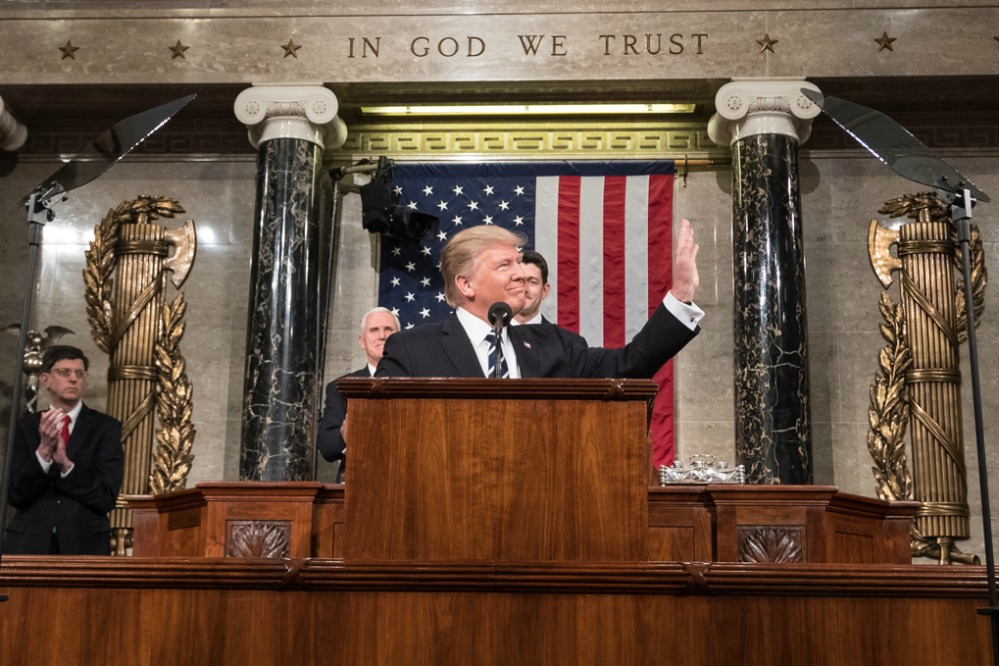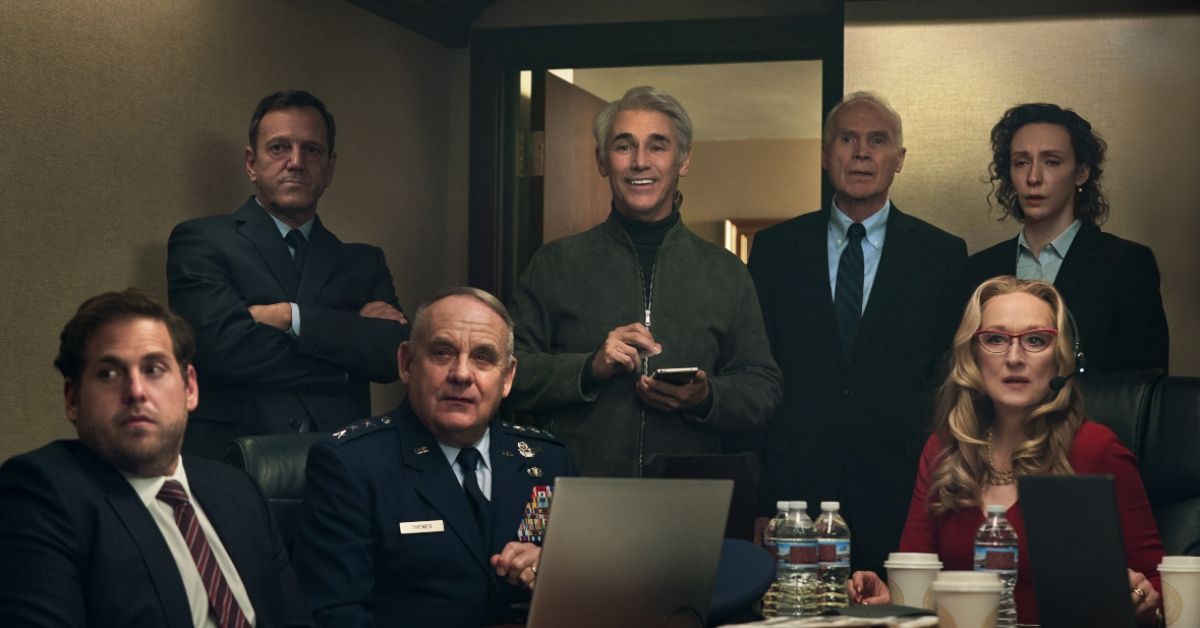Don’t Look Up dramatically exposes the cynicism of the ruling class, who prioritise their own profits above saving the planet. But despite exposing the dead end of capitalism, the film ignores the potential for the working class to transform society.
Adam McKay’s satirical film Don’t Look Up (available on Netflix) is one of the most divisive films of the year just gone – provoking anger amongst the reactionary right and so-called ‘progressive’ liberals alike.
[ALERT! This review contains significant plot spoilers.]
The premise of the film is very simple. We follow astronomer and PhD student Kate (Jennifer Lawrance) and her supervisor, Prof. Mindy (Leonardo DiCaprio), who have discovered an enormous comet heading straight towards Earth. They try to warn the world that there is a 99.7% chance that the planet will be destroyed.
The comet is a clear metaphor for climate change, and the 99.7% probability is a reference to the percentage of scientists who agree that climate change is happening and that human activity is responsible for it.
But as with the impending climate catastrophe, the ruling class in Don’t Look Up cannot see further than their own noses – ignoring the imminent threat in favour of their own narrow interests.
Cynicism

At root, Don’t Look Up is about how the capitalist class – despite having the resources and technology to solve the deadly crises facing humanity – will always act to prioritise their profits over the lives of billions of ordinary people.
To this effect, like a modern-day Dr. Strangelove, the film is good at exposing the cynical calculations of the establishment.
The US president (Meryl Streep) is portrayed as a caricature of Donald Trump, with some elements of Hillary Clinton added. When the astronomers initially attempt to alert the President of the existential threat, she reacts by calculating the impact of the news on the upcoming midterm elections, concluding that telling people of the comet may not be advantageous to her campaign.
Similarly, the film demonstrates the vacuousness of the capitalist media (of all stripes), who are more concerned with selling newspapers and advertising – and maintaining the status quo – than with telling the truth.
Frustrated with the President’s passivity, the astronomers attempt to speak directly to the media. But they find that their news gets barely a mention. Instead, the scientists are told by TV hosts that they need to keep their apocalyptic comments ‘light, airy, and fun’. At the same time, they’re questioned over whether the comet is actually real, whether this is not all a lie, and whether the planet is actually in danger.
Liberal newspaper outlets, meanwhile, decide not to run the story, after social media analysts find little discussion online, and therefore little opportunity for attracting corporate sponsors.
No wonder many mainstream movie critics have responded to the film – and its political message – so negatively and aggressively.
Profit

Only when the President drops in the polls does she decide to take action. But just as rockets are launched into space to blast the comet off course, she changes her mind, after being convinced by the billionaire owner of BASH – a big tech corporation – that the comet is actually an opportunity for tremendous profits.
BASH CEO, Peter Isherwell (Mark Rylance), is an obvious composite of Elon Musk, Mark Zuckerberg, Steve Jobs, and Jeff Bezos. He proposes mining the mineral resources on the comet, worth trillions of dollars. When his plan is leaked, the establishment launches a cynical campaign, explaining that this mining activity will create more jobs.
Insherwell’s plan to mine rare minerals from the comet and shatter it into several harmless pieces fails. However, he and the President – along with a few hundred of the super-rich elite – have a back-up plan: to escape Earth on a spaceship and settle on another far-distant planet, leaving everyone else to die.
Similarly today, with billions facing the drastic consequences of climate change, we see how billionaires like Musk and Bezos are shooting off into space for their own vanity projects. The capitalists, in other words, cannot be trusted to save this planet – they are already living on another planet from the rest of us.
Impotence
At the same time, Don’t Look Up – whether consciously or not – highlights the bankruptcy and impotence of the liberals and liberalism.
When the comet becomes visible in the night sky, the astronomers launch a ‘Look Up’ campaign to convince the President to destroy it.
But instead of seeking to change society through mass struggle, this campaign is based on the liberal approach to activism – that is, by ‘raising awareness’ through pop concerts, etc., and by politely asking politicians to do something, with no involvement from the masses.
Kate, for example, tells the Trump-esque President: “I didn’t vote for you. But this is obviously much bigger than my misgivings. So I will be 100% behind this effort. No matter how offensive I may find you.”
In other words, she states that this is not a political question; that they should put aside their differences, and all come together.
But such appeals prove to be fruitless, with the ruling class completely ignoring all these liberal pleas in favour of their own short-sighted concerns.
Working class
 The liberals can go no further than such impotent appeals because they are incapable of seeing that the solution lies with the working class. Indeed, in Don’t Look Up, the working class is portrayed as sheepish and stupid.
The liberals can go no further than such impotent appeals because they are incapable of seeing that the solution lies with the working class. Indeed, in Don’t Look Up, the working class is portrayed as sheepish and stupid.
On the one hand, they are depicted simply as people who riot and loot. On the other hand, the supporters of the President’s ‘Don’t Look Up’ campaign sneeringly caricature working-class Trump supporters. The film mocks how some people might be attracted to the idea that mining the comet ‘will create jobs’.
This is typical of how the liberal establishment has failed to understand the Trump phenomena. The real-life former President gained popularity within a section of the working class through his promises to revitalise the US economy.
Millions of ordinary workers and youth, meanwhile, were rightly disgusted by the liberal alternative – represented by establishment figurehead Hillary Clinton.
Throughout the film, the liberals cannot grasp the revolutionary potential that the working class possesses. Even the very idea of revolution is mocked when Prof. Mindy rhetorically asks Kate: “What do you want to do? Overthrow the government?!” But that’s exactly what needs to be done.
If the entire planet – with the lives of the eight billion people who live on it – is at stake, about to be lost just for a potential opportunity to make the rich even richer, then taking matters into our own hands would be a very reasonable suggestion.
Pessimism
The film is ultimately profoundly pessimistic and fatalistic: a reflection of the outlook of liberals who see only doom and gloom as capitalism further deteriorates. Whether on the climate question, the pandemic, or even sexism and racism, they have nothing to offer.
Of course, this is not the first film about a comet threatening our planet – see Deep Impact or Armageddon, for example. However, it is extremely telling how confident these earlier films were that humanity would be saved – and that the government could be trusted to competently do so – compared with the modern offering of Don’t Look Up.
Today, such illusions have been vaporised by the ruling class’ woeful response to the capitalist crisis, climate change, and the pandemic. And it is true that if such issues are left to the capitalist class to solve, the result will be that millions of ordinary people will die.
Revolution

Don’t Look Up offers a stark picture of the callousness of the ruling class in the face of catastrophe. But where the film fails is in its lack of any solution to the crises facing humanity. This is ultimately the product of the fact that the film has been made from a liberal, rather than a socialist, point of view.
At the end of the film the protagonists realise that all is lost; they are doomed. Kate says: “I’m thankful that we’ve tried”. But had they actually tried?
Politely asking the establishment to give up their profits through a toothless campaign was bound to get them nowhere. And when their campaign predictably fails, they resign themselves to their fate. They return to their families, and seek comfort in religion.
Yet this film has been released in a period where millions worldwide have taken to the streets over the climate, Black Lives Matter, and against austerity. The potential for the working class to take power into its own hands to solve the crisis is completely ignored throughout.
The pessimistic liberals and reformists are oblivious to the fact that as capitalism declines, a new society is struggling to be born.
By contrast, Marxists are filled with a revolutionary optimism; with a confidence that workers and youth can transform society and determine their own destiny.
We need to shape our own fate and take ownership over our future. Whilst the liberals sit and weep, we fight for a socialist society based on the needs of the working class.






